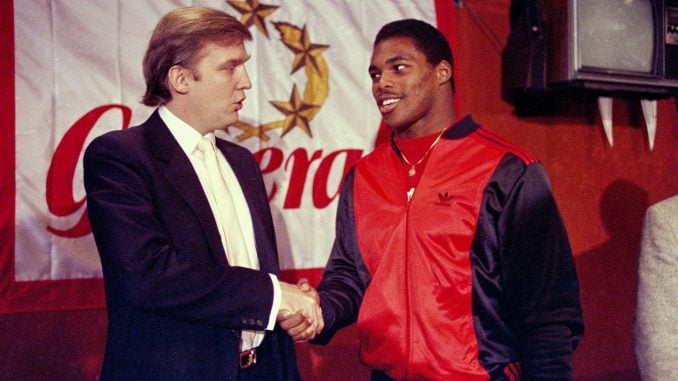
If there’s one lesson to take from the brief history of the USFL, it’s this: Always perform due diligence.
Time and again in Jeff Pearman’s wildly entertaining account of the early 1980s competitor to the NFL, “Football for a Buck,” the upstart league runs into trouble when it fails to confirm identities and check facts.
There was Albert C. Lynch, the self-proclaimed linebacker who showed up at an open tryout for the Chicago Blitz. He was small, slow and had no experience playing football at any level, but he managed to figure out where the coaches were sending the players that earned a spot. He reported there, identified himself, and earned a spot on the team’s earliest roster, before his scam was figured out.
There was Dave Rimington, the standout offensive lineman at Nebraska and the player for whom the trophy given to the top center in college football is now named. After prolonged phone negotiations, he agreed to a contract with the Boston Breakers, becoming one of the first college stars to choose the new league over the established NFL. Or so they thought. At the huge media event at Logan Airport to welcome his arrival to Boston, the team found out that they’d been negotiating with an imposter all along, and the real Rimington had no intention of choosing the USFL.
And there was John Barron. Identifying himself as the publicist for the New York/New Jersey Generals, Barron called New York newspapers to tell them that Hall of Fame linebacker Lawrence Taylor was negotiating a contract with the team and planned to jump ship from the NFL Giants. As it turned out, John Barron didn’t exist and the person on the phone, doing his best to disguise his voice, was actually the team’s owner, Donald Trump.
The current president of the United States casts a long shadow over Pearlman’s work. The first page of the book, coming even before the title page, is a copy of a letter sent to Trump by an owner of another USFL team, John F. Bassett of the Tampa Bay Bandits.
Bassett admonished Trump for his “personal abuse” of the league commissioner and other owners, when they don’t agree with him at meetings.
“While others may be able to let your insensitive and denigrating comments pass,” Bassett wrote, “I no longer will.” The owner then threatened to “punch you right in the mouth” the next time he does it.
Indeed, Trump’s presence as the league’s most notorious owner and, as Pearlman readily admits, one of the key reasons for the USFL’s demise, is the main reason the book saw the light of day. A passion project for Pearlman, the meticulously researched history is one that he had to fight to get published.
“My agent told me nobody wants a USFL book,” Pearlman tweeted. “Publishers told me nobody wanted a USFL book. But I wanted a USFL book — so I took v-e-r-y little money and did it.”
Pearlman’s research for the book coincided with the 2016 campaign, making the task of digging up anecdotes from the 30-years-gone league that much more difficult.
“Maybe the strangest thing I’ve experienced as a journalist,” Pearlman said upon the book’s release. “Here I am, simultaneously going back in time to watch Donald Trump enter — then ruin — a football league as he’s campaigning for the presidency. I mean, super weird. And hard.”
Trump comes off as the clear-cut villain in the book. He came close to torpedoing the league before it had ever played the game, backing out of a commitment to be one of the league’s charter owners, by speaker phone, at a meeting scheduled for the sole purpose of introducing him as the owner of the keystone New York franchise.
After the first season, Trump did buy into the league and immediately began stepping on toes and pushing his own agenda.
“If we’re being honest, Trump was a poisonous snake when it came to the USFL,” Pearlman said. “He never showed an ounce of concern for its long-term success. He wanted an NFL team and saw this as the easiest route. He stomped on heads, crushed dreams, lied about 100 times a day, and, when the USFL died, he ultimately referred to it as ‘small potatoes.’”
Despite Trump’s off-field drama, the story of the USFL sings most loudly when Pearlman discusses the players themselves. A collection of college superstars and NFL has-beens, the league was a quirky mishmash of personalities and talent levels, leading to some crazy stories.
“First, fun,” Pearlman says of the underlying message of his history. “Lots and lots and lots of fun.”
Even if a certain ambitious owner never got his promised punch in the mouth.



